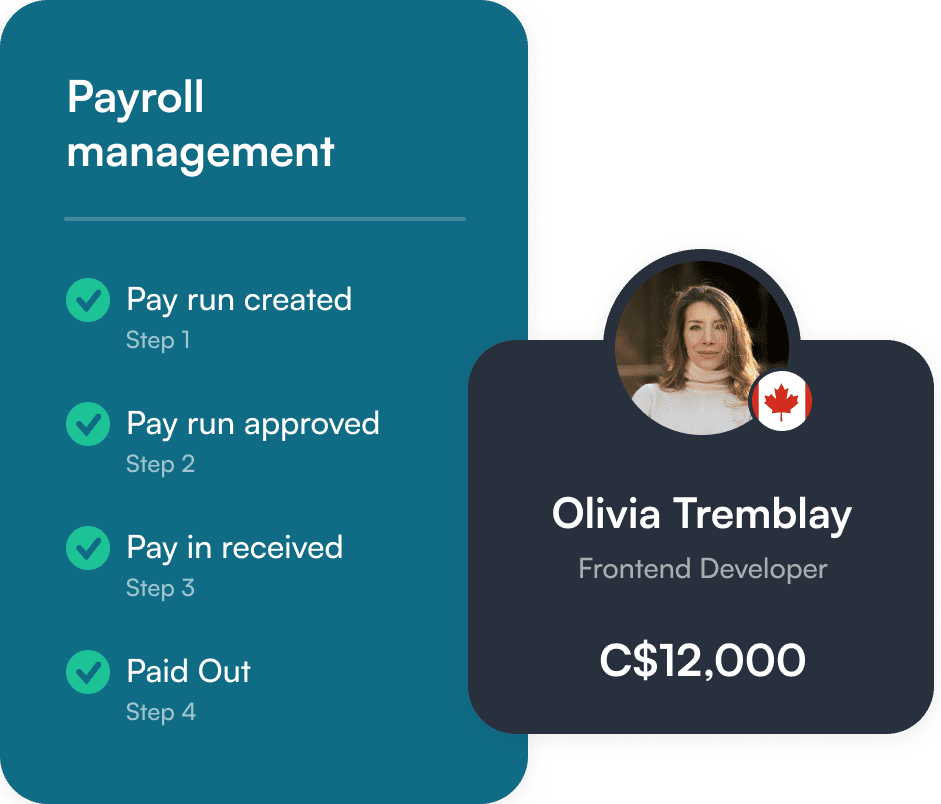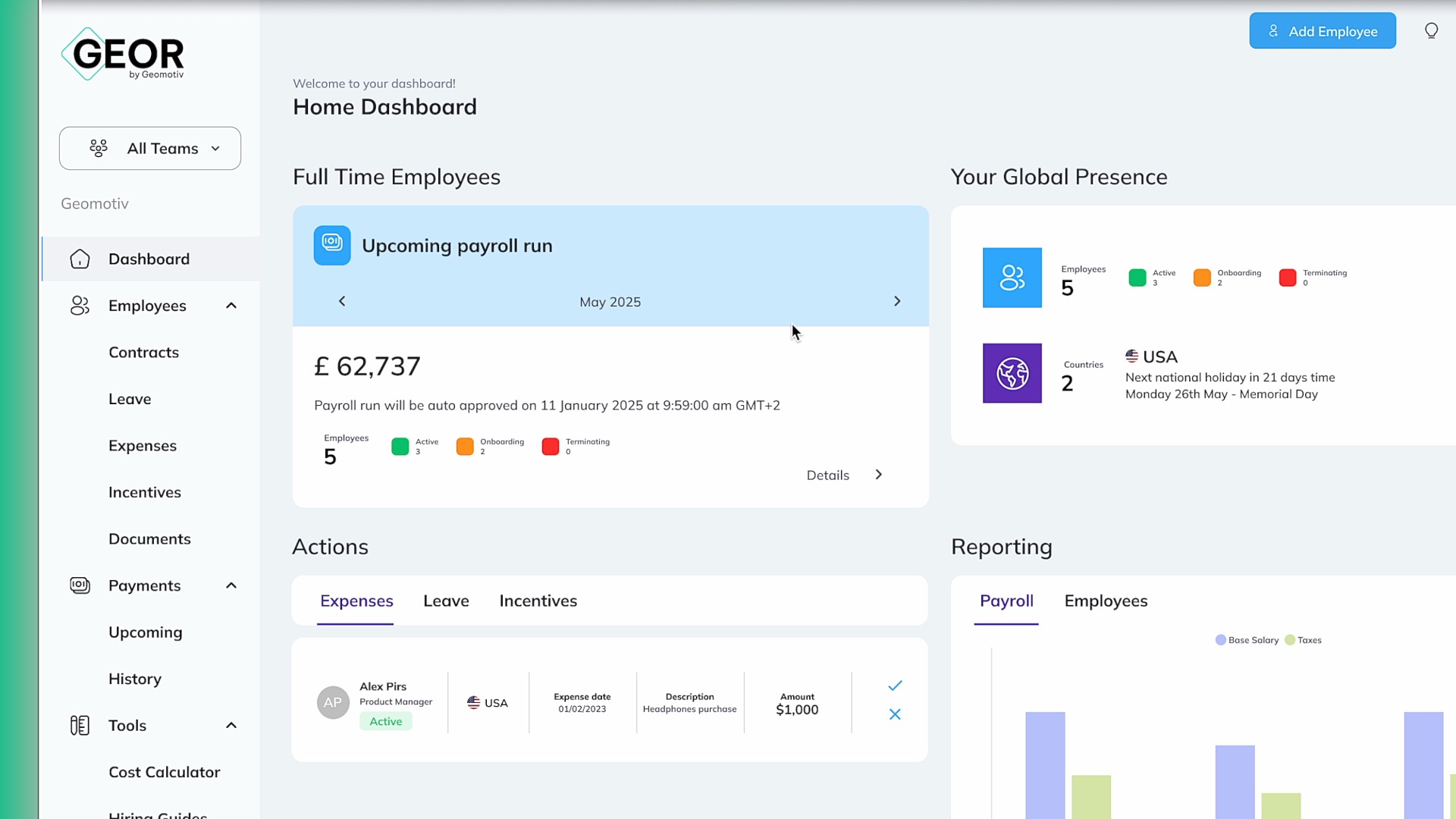- Quick setup in 7 daysComplete payroll onboarding, registrations, and system setup within one week.
- Accurate monthly reportingProcessing pay stubs, deductions, and timely submissions to Canadian tax and social agencies.
- Compliance assuredSalaries, contributions, and benefits fully aligned with Canadian labor laws and tax regulations.
- IP and confidentiality protectionContracts safeguard intellectual property, confidentiality, and invention rights.
- Support for all work modelsLegal contracts and reimbursements for remote, on-site, or hybrid teams.
- Scalable and agileEasily grow or reduce your workforce without provider changes or rigid contracts.
Payroll Sevices in Canada
Cost-effective payroll solutions for tech employees in Canada.

Reliable payroll provider in Canada
Payroll outsourcing in Canada made simple.

Canada
$2.3 trillion (2025 projection)
English and French
Canadian Dollar (C$, CA$)
C$80k – C$150k/year ($60k–$113k)
Canada tax structure overview
Income
15%–53%, federal and provincial combined.
Employer contributions
Approx. 7.5%–8.2% Canada Pension Plan (CPP) and Employment Insurance (EI), province-dependent.
Employee contributions
Approx. 7.5% CPP and EI, deducted from salary.
Freelancers
CPP, EI (if applicable), plus 5%–15% Goods and Services Tax / Harmonized Sales Tax (GST/HST).
Reporting
Monthly filings to Canada Revenue Agency (CRA) and provincial authorities.
Payroll in Canada holding you back?
Partner up with us to get it sorted.
Employment law insights
Minimum wage (2025)
C$2,403/month (approx. $1,800); varies by province.
Overtime pay
1.5x regular rate after standard hours; different provincial rules apply.
Payroll frequency
Biweekly or monthly
Pay stub
Must clearly list all earnings, deductions, and contributions; can be digital or printed.

Common IT benefits and leave
- Mandatory CPP and EI employer contributions.
- 10–15 days vacation plus statutory holidays.
- Parental leave up to 18 months, partially paid.
- Annual and performance-based bonuses; equity participation.
- Private health plans, home-office reimbursements, mental health support, and learning budgets.
Payroll laws for tech employers
Payroll is a complex system that allows no mistakes. Mastering its nuances is essential. Below, we highlight the critical aspects every tech employer must know.
Understanding principal distinctions between employees and contractors ensures compliant onboarding in Canada, speeds up processes, and minimizes legal risks and penalties.
Hired under full Canadian labor law protections.
- Receive public healthcare, CPP and EIbenefits.
- Entitled to paid vacation (10–15 days), parental and sick leave.
- Severance pay and notice periods apply.
Self-employed with freelance contracts.
- Manage own tax registration, VAT, and benefits.
- Set their own hours and use personal equipment.
Avoid employee reclassification by ensuring contractors maintain independence.
Authorities may reclassify contractors as employees if they:
- Follow company-set schedules.
- Use company tools or systems.
- Report to managers.
- Work predominantly for one client over time.
Remote status doesn’t guarantee contractor classification. Off-site developers risk reclassification if they:
- Regularly attend team meetings.
- Submit deliverables for approval.
- Use internal collaboration tools (GitHub, Jira, Slack).
- Are paid on recurring schedules or milestones.
Remote employees must have formal contracts and be registered for payroll, taxes, and benefits.
Tech companies routinely use stock-based compensation as a retention tool in Canada. All equity income triggers tax obligations and must be reported accordingly.
Companies must issue pay stubs with every payroll cycle. Employers own full accountability for data accuracy and must maintain secure records for minimum 6-year periods.
- Gross pay.
- Net income.
- Detailed deduction categories.
- Tax withholdings, CPP contributions, and EI premiums.
- Pay period dates.
- Bonuses, allowances, and benefit values.
- Employer and employee identification numbers.
Canadian payroll regulations differ by province and contract, requiring province-specific compliance strategies.
Avoiding payroll filing mistakes
A quick guide to navigating payroll challenges in Canadian hiring.
Provincial payroll variations
Different provinces require specific tax rates and reports, complicating payroll for multi-region teams.
Strict payroll deadlines
Late or missed payroll filings result in fines and administrative restrictions.
Transparent pay requirements
Contracts and pay stubs must clearly reflect total compensation exceeding legal minimums.
Pay stub compliance
Every pay stub must itemize deductions, tax IDs, and employee benefits accurately.
Data privacy
Employee data must comply with GDPR and Canadian privacy laws.
Social security reporting
Delays or errors in social contributions can block employee access to healthcare and pensions.
Remote work expenses
Employers must reimburse legitimate remote work costs and keep detailed documentation.
Contractor misclassification
Classifying freelancers as employees risks severe fines and back payments.
Benefits tracking
Paid vacation, sick leave, and bonuses must be calculated accurately.
Currency and payment rules
Salaries must be paid in Canadian dollars, even if the company uses a different currency.
Delivering payroll excellence in Canada
A precision-built service featuring an automated workforce management platform and expert local guidance in Canada, tailored to real tech workflows.

A unified system for managing salaries, deductions, taxes, and reporting.
We handle employee registration, contributions, filings and issue detailed pay stubs every cycle.
All salary payments go through Canadian banks to prevent delays and compliance issues.
Easily add health coverage, equity, bonuses, or coworking budgets without extra overhead.
Secure, encrypted data storage that meets Canadian privacy standards.
Our HR specialists navigate complex labor laws and ensure ongoing compliance.
Explore Our Payroll Platform
See how the Global Employer Of Record platform helps you seamlessly manage your global workforce — from hiring and compliance to payroll and employee requests — all in one place.

Roadmap for maximizing profit
Over the years, we’ve empowered hundreds of tech teams. Based on the data we’ve gathered, here’s what you can expect to achieve with our payroll services in Canada.
Our base package suits early hires, startups, and distributed teams entering Canada. Ideal for market testing, contractor conversions, or onboarding your initial developers. It offers the best payroll for small business in Canada, combining compliance and simplicity.
- Onboarding within 7 days
- Payroll processing
- Pension, social fees, and reporting
per employee/ month.
No hidden fees or extra charges.
Discover payroll solutions in Canada
No need for in-house HR or a local entity to pay your team in Canada. Our payroll services ensure full legal compliance with minimal complexity. Ready to begin? Book a call for expert guidance on setup.

Best payroll service in Canada
We don’t offer off-the-shelf solutions — we deliver personalized payroll management for tech companies.
| Feature | GEOR | Canadian Payroll Services | ADP |
|---|---|---|---|
| Local expertise and sector focus | Canadian team, tech-focused compliance and labor knowledge. | General Canadian expertise, limited tech focus. | Strong local and global presence, serving multiple industries. |
| Compliance framework | Automated systems, legislative updates, high compliance standards. | Accurate tax and reporting, less automation. | Industry-leading tech, real-time updates, thorough audits. |
| Digital-first approach | Automated payroll and workforce platforms tailored for software workflows. | Conventional payroll software with basic functionality. | Cloud-based, mobile-accessible, with analytics and integrations. |
| Equity and bonuses inclusion | Full management of RSUs, stock options, and bonuses with compliant reporting. | Limited equity compensation support. | Comprehensive equity and bonus management with automated tax treatment. |
| Onboarding speed and local support | Rapid 7-day onboarding, personalized local HR support. | Standard onboarding timelines, structured support. | Longer onboarding, extensive but less personalized support. |
Certified payroll in Canada
Over many years working with global tech teams, we have pinpointed exactly what it takes to keep your operations running smoothly and maintain building momentum. Our seamless payroll system removes bureaucratic hurdles, making complex processes feel effortless. Imagine a fully compliant payroll solution just one click away, giving you confidence that your workflows are aligned and ready from day one.
Begin payroll now.
And take a quantum leap to your next level.
FAQs
Mainly SaaS firms, AI and tech teams, and international companies expanding their presence in Canada.
Yes, we serve global companies managing payroll for their employees across Canada.
Yes. GEOR enables onboarding and payroll management without the need to establish a legal entity.
No, you don’t need to have local representatives. We will handle onboarding, payroll, and benefits administration, eliminating the need for your own internal HR staff in Canada.
Pay stubs must follow strict formatting guidelines. Monthly filings to tax authorities and social security agencies are mandatory and must accurately reflect working hours and legally required deductions. Provincial variations exist: for example, Quebec requires additional filings under the Quebec Pension Plan (QPP) and Parental Insurance Plan (QPIP), while Ontario and British Columbia have distinct health premiums and tax credit programs that affect payroll processing.
We calculate and file all necessary income tax deductions, employer contributions to social security (CPP and EI), and other mandated payments.
Yes. We handle RSUs, stock options, and performance bonuses as part of standard payroll processing and reporting.
Our service covers remote contracts, expense reimbursements, and ensures compliance with legal requirements for off-site work.
Yes. We manage employment contracts and assist in structuring compliant agreements for independent contractors.
We assess control, scheduling, and payment structure according to Canadian labor regulations to ensure proper classification.
Contractors register with the tax authorities, issue invoices for their services, and are responsible for managing their social security and applicable sales taxes.
Employees receive digital pay stubs detailing gross pay, deductions, and contribution breakdowns each pay period.
We adhere strictly to GDPR and Canadian privacy laws. All pay stubs are securely encrypted and delivered through compliant channels.
Unlike providers relying solely on automation, GEOR offers hands-on expertise from our Canadian team, ensuring accurate filings, compliance with social security requirements, and a deep understanding of tech-sector payroll specifics.
Complete hiring support in Canada
Beyond payroll, we provide workforce solutions to empower your team and simplify HR management.
Отправляя данную форму вы подтверждаете свое согласие с Политикой конфиденциальности





